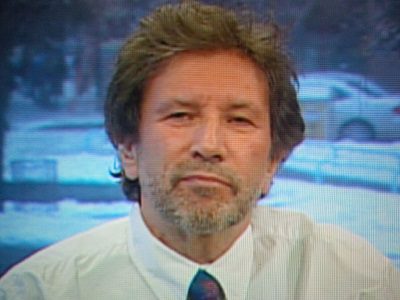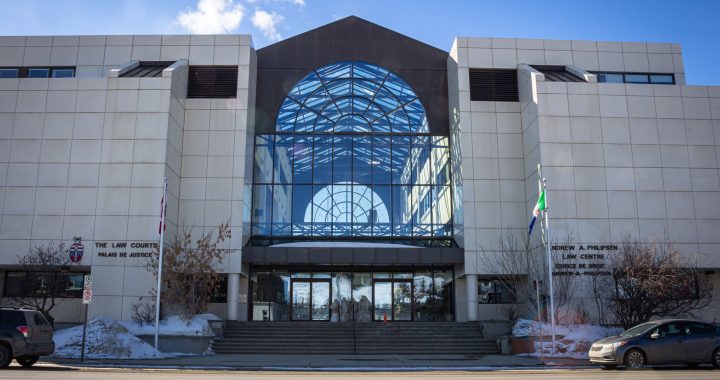(left to right): Donna Rogers-Necan, Thelma Fair and Darlene Necan protesting outside Kenora lawyer Doug Keshen’s office in June, 2014.
Photo courtesy Darlene Necan
By Kathleen Martens
APTN Investigates
The Law Society of Upper Canada has accused one of its members of “professional misconduct” for the way he handled some residential school survivor compensation cases.
It has ordered Kenora, Ont., lawyer Doug Keshen to appear at a conduct hearing in Toronto later this month on charges he mishandled the compensation claims of 12 residential school survivors, and wrongly loaned money to 28 clients.
It further alleges money went missing from some survivors’ accounts.
The compensation is part of the IAP or Independent Assessment Process. It pays survivors who say they were seriously physically abused, physically or sexually, by staff or other students at the government-funded, church-run schools.
Compensation is part of the Indian Residential Schools Settlement Agreement (IRSSA).
 Keshen is one of more than a dozen lawyers whose dealings with survivors across Canada are being investigated by IAP officials, who work in the Indian Residential Secretariat and oversee the compensation process.
Keshen is one of more than a dozen lawyers whose dealings with survivors across Canada are being investigated by IAP officials, who work in the Indian Residential Secretariat and oversee the compensation process.
These officials have repeatedly warned lawyers to do their due diligence with vulnerable survivor-clients who need special care. Yet complaints keep coming in. So many, in fact, that a former B.C. Supreme Court judge has been hired to sift through them all.
Some of those complaints involve Keshen, a veteran lawyer whose firm was a signatory to the IRSSA and employed now-Kenora MP Greg Rickford, minister of natural resources in the Harper cabinet.
Keshen told APTN Investigates he does not believe he did anything wrong.
But in the law society document obtained by aptn Investigates, members of the tribunal hearing division outline grounds for their charges against Keshen.
The allegations include: failing to communicate with 12 clients at all stages of their matters, failing to personally attend the IAP hearings of two survivors (sending an articling student instead), failing to deliver statements of account to clients, making personal, “interest-free” advances/loans to 17 clients, and arranging “high-interest” loans from Alberta company Settlement Lenders for nine clients.
When, the society says, “he knew or ought to have known that judicial rulings and section 18.01 of the IRSSA dated May 8, 2006 clearly prohibited such loans/advances.”
Here, Keshen says he was trying to help survivors and reduce their stress as they waited months for their compensation cheques to arrive from Ottawa. He says clients asked him for financial help in the interim.
The society says between 2003 and 2012, Keshen breached his legal duties by delegating tasks and functions to his employees, including reviewing retainer agreements with clients, preparing and drafting applications for compensation, communicating with clients, and managing and distributing the compensation he received in trust.
He further, the society alleges, paid himself first between 2006 and 2012 before giving clients their bills. And, the society claims, he allegedly didn’t pay 17 clients their full compensation within a reasonable time of receiving it, took a cut for GST and service fees, and transferred $45,000 to his general account from the trust account “without any legal entitlement to the monies.”
He also, the society says, allegedly charged clients legal fees not related to their compensation claims. As much as $7,520 each from two clients, it alleges, and $6,500 from a third.
Most disturbing, is the allegation that Keshen prepared a Power of Attorney for a “vulnerable” client “without ensuring he was capable” and transferred $119,300 from that client’s settlement funds to the lawyers.
These are not criminal charges but could lead to fines and disbarment. The law society may also turn over its evidence to police to see if criminal charges are warranted. That’s what happened in Winnipeg after the Law Society of Manitoba disbarred lawyer Howard Tennenhouse for taking nearly a million dollars from 54 survivors. The file is still with Winnipeg police.
Another lawyer in Calgary, David Blott, resigned from the Law Society of Alberta for putting thousands of survivors through what was called an assembly-line-type system of dealing with compensation files, short-changing them professionally and ethically.
Those survivors are now suing Blott for damages.











